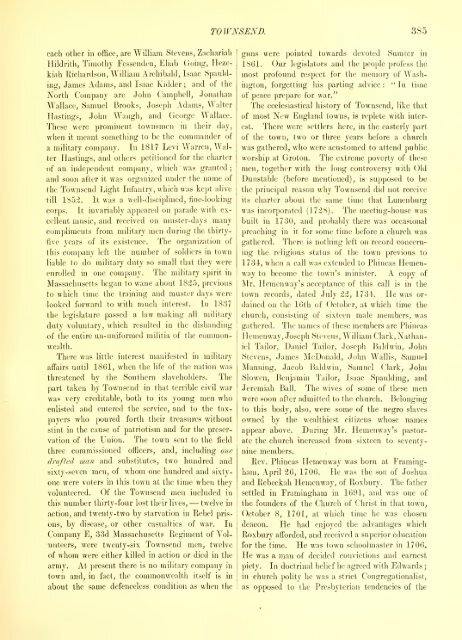History of Middlesex County, Massachusetts - citizen hylbom blog
History of Middlesex County, Massachusetts - citizen hylbom blog
History of Middlesex County, Massachusetts - citizen hylbom blog
Create successful ePaper yourself
Turn your PDF publications into a flip-book with our unique Google optimized e-Paper software.
each otlier in <strong>of</strong>Rce, are William Stevens, Zacliariah<br />
Hildrith, Timothy Fessenden, Eliiib Cioing, Heze-<br />
kiah Richardson, William Archibald, Isaac Spauld-<br />
ing, James Adams, and Isaac Kidder ; and <strong>of</strong> the<br />
North Company are John Campbell, Jonathan<br />
Wallace, Samuel Brooks, Joseph Adams, Walter<br />
Hastings, John Waugii, and George Wallace.<br />
Tliese were prominent townsmen in their day,<br />
wjien it meant something to be the commander <strong>of</strong><br />
a military company. In 1817 Levi Warren, Wal-<br />
ter Hastings, and others petitioned for the charter<br />
<strong>of</strong> an independent company, which was granted;<br />
and soon after it was organized under the name <strong>of</strong><br />
the Townsend Light Infantry, which was kept alive<br />
till 1S5£. It was a well-disciplined, fine-looking<br />
corps. It invariably appeared on parade with excellent<br />
music, and received on muster-days many<br />
compliments from military men during the thirty-<br />
five years <strong>of</strong> its existence. The organization <strong>of</strong><br />
this company left the number <strong>of</strong> soldiers in town<br />
liable to do military duty so small that they were<br />
enrolled in one company. The military spirit in<br />
<strong>Massachusetts</strong> began to wane about 18£5, previous<br />
to which time the training and muster days were<br />
looked forward to with much interest. In 1837<br />
the legislature passed a law making all military<br />
duty voluntary, which resulted in the disbanding<br />
<strong>of</strong> the entire un-uuiformed militia <strong>of</strong> the common-<br />
wealth.<br />
There was little interest manifested in military<br />
affairs until 1861, when the life <strong>of</strong> the nation was<br />
threatened by the Southern slaveholders. The<br />
part taken by Townsend in that terrible civil war<br />
was very creditable, both to its young men who<br />
enlisted and entered the service, and to the tax-<br />
payers who poured forth their treasures without<br />
stint hi the cause <strong>of</strong> patriotism and for the preser-<br />
vation <strong>of</strong> the Union. The town sent to the field<br />
three commissioned <strong>of</strong>ficers, and, including one<br />
drafted man and substitutes, two hundred and<br />
sixty-seven men, <strong>of</strong> whom one hundred and sixty-<br />
one were voters in this town at the time when they<br />
volunteered. Of the Townsend men included in<br />
this number thirty-four lost their lives, — twelve in<br />
action, and twenty-two by starvation in Rebel pris-<br />
ons, by disease, or other casualties <strong>of</strong> war. In<br />
Company E, 33d <strong>Massachusetts</strong> Regiment <strong>of</strong> Vol-<br />
unteers, were twenty-six Townsend men, twelve<br />
<strong>of</strong> whom were either killed in action or died in the<br />
army. At present there is no military company in<br />
towii and, in fact, the commonwealth itself is in<br />
TOWNSEND. 385<br />
guns were pointed towards devoted Sumter in<br />
1S61. Our legislators and the people pr<strong>of</strong>ess the<br />
most pr<strong>of</strong>ound respect for the memory <strong>of</strong> Wash-<br />
ington, forgetting his parting advice : " In time<br />
<strong>of</strong> peace prepare for war."<br />
The ecclesiastical history <strong>of</strong> Townsend, like that<br />
<strong>of</strong> most New England towns, is replete with inter-<br />
est. There were settlers here, in the easterly part<br />
<strong>of</strong> the town, two or three years before a church<br />
was gathered, who were acustomed to attend public<br />
worship at Groton. The extreme poverty <strong>of</strong> these<br />
men, together with the long controversy with Old<br />
Dunstable (before mentioned), is supposed to be<br />
the principal reason why Townsend did not receive<br />
its charter about the same time that Lunenburg<br />
was incorporated (17^8). The meeting-house was<br />
built in 1730, and probably there was occasional<br />
preaching in it for some time before a church was<br />
gathered. There is nothing left on record concern-<br />
ing the religious status <strong>of</strong> the town previous to<br />
1734, when a call was extended to Phineas Hemenway<br />
to become the town's minister. A copy <strong>of</strong><br />
Mr. Hemenway's acceptance <strong>of</strong> this call is in the<br />
town records, dated July 22, 1734. He was or-<br />
dained on the 16th <strong>of</strong> October, at which time the<br />
church, consisting <strong>of</strong> sixteen male members, was<br />
gathered. The names <strong>of</strong> these members are Phineas<br />
Hemenway, Joseph Stevens, William Clark, Nathaniel<br />
Tailor, Daniel Tailor, Joseph Baldwin, Joim<br />
Stevens, James McDonald, John Wallis, Samuel<br />
Manning, Jacob Baldwin, Samuel Clark, John<br />
Slowen, Benjamin Tailor, Isaac Spaulding, and<br />
Jeremiah Ball. The wives <strong>of</strong> some <strong>of</strong> these men<br />
were soon after admitted to the churcii. Belonging<br />
to this body, also, were some <strong>of</strong> the negro slaves<br />
owned by the wealthiest <strong>citizen</strong>s whose names<br />
appear above. During Mr. Hemenway's pastor-<br />
ate the church increased from sixteen to seventy-<br />
nine members.<br />
Rev. Phineas Hemenway was born at Framingham,<br />
April 26, 1706. He was the son <strong>of</strong> Joshua<br />
and Rebeckah Hemenway, <strong>of</strong> Roxbury. The father<br />
settled in Framingham in 1691, and was one <strong>of</strong><br />
the founders <strong>of</strong> the Church <strong>of</strong> Christ in that town,<br />
October 8, 1701, at which time he was chosen<br />
deacon. He had enjoyed the advantages which<br />
Roxbury afforded, and received a superior education<br />
for the time. He was town schoolmaster in 1706.<br />
He was a man <strong>of</strong> decided convictions and earnest<br />
piety. In doctrinal belief he agreed with Edwards<br />
in church polity he was a strict Congregationalist,<br />
about the same defenceless condition as when the as opposed to the Presbyterian tendencies <strong>of</strong> the<br />
;

















